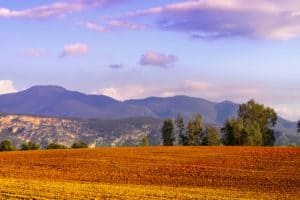A recent feature in the Wall Street Journal reported that urban and suburban residents were buying and moving back to the country. (Gwendolyn Bounds, The Wall Street Journal, “Green Acres Is the Place to Be,” December 2, 2009.)
Bounds wrote that the “rural [real estate] market is holding up better in many areas [than urban and suburban real estate] thanks in part to …buyers…sometimes dubbed ‘ruralpolitans’.” Bounds defines ruralpolitans as city and town dwellers who are looking for a new safe investment, one that is more stable than a job or a retirement account and one that provides lifestyle amenities.
She further describes these buyers as falling into one of three groups: 1) young people buying land as an asset or investment; 2) exurban commuters escaping sprawl; and 3) back-to-the-land types dabbling in hobby farming. She cites several examples of young singles moving to the country, mainly for economic reasons.
Further descriptors of this sociological trend include professionals, living on three or more acres within a 40-minute drive of a city, with two wage earners and a majority of income coming from off-the-farm sources.
I would add that buyers of rural property are often retirement relocators, or niche farmers (motivated by lifestyle and often organic food production) or, of course, second-homers.
Another group is individuals returning to the country (where they were born and raised) after making a living and a life in a city. These folks are often statistically masked as retirees, but they’re a separate group in my thinking.
It’s one thing for a ruralpolitan to come to the “out here”; it’s another to stick.
In my area, it appears that two years is the make-or-break mark for newcomers. Those who pass that, generally stay.
I’ve seen newcomers leave for different types of reasons, but several seem fairly common.
Bad experience in the purchase process.
I’ve seen newcomers turned off by some “surprise” in the property that the seller did not disclose, or disclosed inadequately. A boundary dispute with neighbors, an unrecorded easement that allows neighbors to travel over the new owner’s land, an undisclosed reservation of interest in the timber or hunting rights, a quirky situation with shared springs—these unresolved situations linger and are often hard for the newcomer to resolve satisfactorily. These “bad tastes” have a way of turning more bitter over time.
Bad experience after purchase.
It’s difficult to imagine living in a new house in a new community in a new environment without actually doing so. I’ve seen newcomers find themselves in unexpected problems that they had not anticipated. No one forgets being blind-sided.
Newcomers are often annoyed by matters that they did not anticipate and neighboring sights and sounds with which they’re unfamiliar. Common annoyances can include barking hunting dogs, target shooting off the back porch, bright security lights, early morning truck warm ups, dirt bikes, farm-related activity and so on. Less common are military low-level over-flights and new development (wind farms on ridges within eyesight, golf-housing projects).
Some situations of this sort cannot be solved. The newcomer either adapts and adjusts, or leaves.
Big mistakes made early.
New owners often make changes in their new country places right away, before they know the ways of the existing house, the property infrastructure and the land itself.
I’ve seen newcomers try to shoehorn land suited for one purpose into the mold of another, with costly results.
It’s easy to lose a fair amount of money doing anything for the first time. Newcomers don’t realize that they need a base of experience, not just knowledge and interest, to produce organic crops and livestock as a profit-making business.
For this reason, I always advise clients to start change slowly and piggyback on relevant local experience and mentors.
Unreasonable expectations.
A friend of mine has grown very disappointed with the rural community he moved to three years ago: “The people are just like those I left,” he says. He was expecting more honesty and friendliness.
Country communities have working lines back to a different type of business ethics. But I’ve seen members of the same family act in ethically incompatible ways. Some of the brothers are old school and their word is always good; other brothers cannot be trusted.
Crooked dealing is not new to our generations, or to city life. It’s simply unreasonable to expect that every farmer with manure on his boots is a paragon of virtue.
Each newcomer has to figure out who is worth working with in his new community and who should be avoided. Sometimes, you just have to get your nose bloodied to learn who is who.
Brokers and agents representing incoming buyers can do a lot to make their clients’ transitions smoother and more predictable. A more broadly conceived idea of what constitutes “due diligence” is involved. It’s more than just figuring values and clearing up disputes with the seller.
Local brokers and agents will often know about site-specific conditions and situations that will turn out to be crucial to the buyer’s possession, use and enjoyment of the seller’s property.
If brokers and agents don’t feel comfortable going into these issues, a fall-back position might be to share certain questions with their buyer-clients and let them decide whether or not to explore them. This is a tricky situation for all concerned.
I’ve seen brokers lose a sale, because they told their buyers about a condition that they thought material to the purchase but probably wasn’t required of them to disclose.
They did the right thing.
This content may not be used or reproduced in any manner whatsoever, in part or in whole, without written permission of LANDTHINK. Use of this content without permission is a violation of federal copyright law. The articles, posts, comments, opinions and information provided by LANDTHINK are for informational and research purposes only and DOES NOT substitute or coincide with the advice of an attorney, accountant, real estate broker or any other licensed real estate professional. LANDTHINK strongly advises visitors and readers to seek their own professional guidance and advice related to buying, investing in or selling real estate.









Add Comment